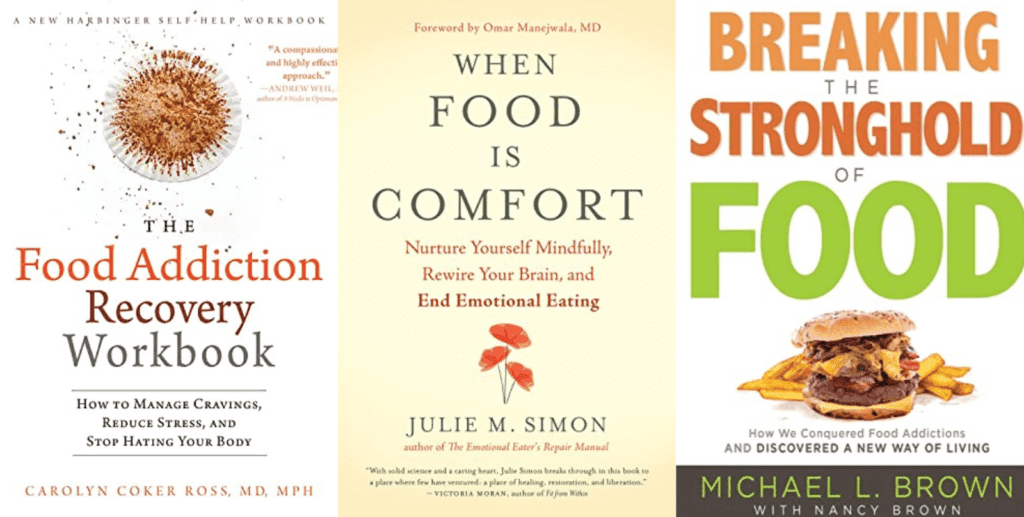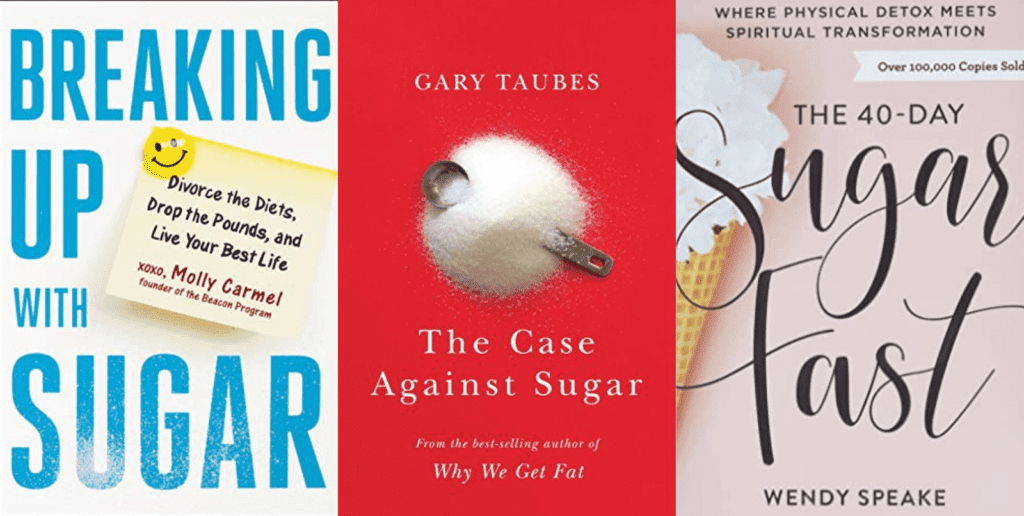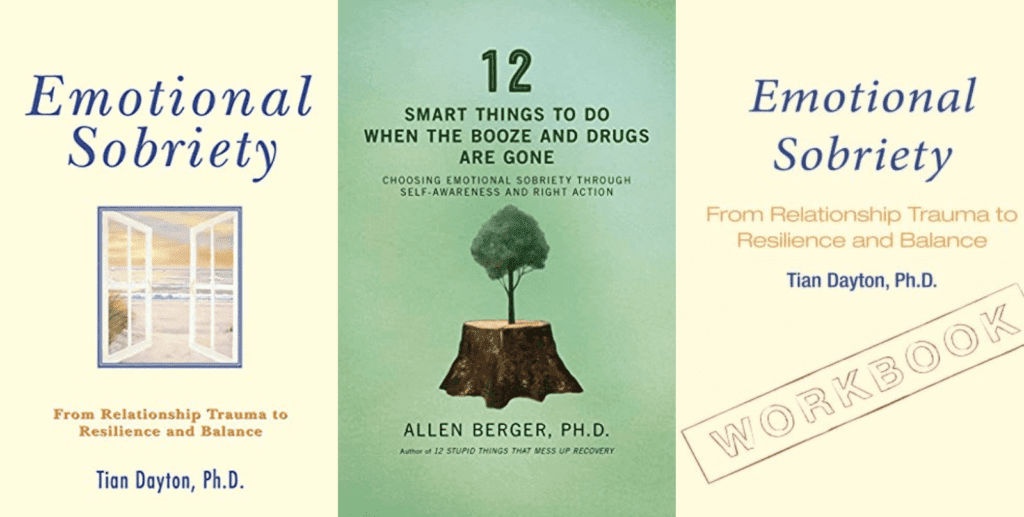The following are some of the best food addiction books to help you on your healing journey.
- What Are The Signs of Food Addiction?
- Food Addiction Books
- 1. Never Binge Again(tm)
- 2. The Intuitive Eating Workbook
- 3. Hooked
- 4. Rezoom
- 5. Breaking the Stronghold of Food
- 6. When Food Is Comfort
- 7. Weight Loss Surgery Does NOT Treat Food Addiction
- 8. Food Junkies
- 9. The Food Addiction Recovery Workbook
- 10. When Food Is Your Drug
- 11. Food Addiction
- 12. The Binge Eating Prevention Workbook
- 13. Anatomy of a Food Addiction
- How Food Addiction Books Can Help
- Conclusion
Disclosure: Some of the links below are affiliate links. This means that, at zero cost to you, I will earn an affiliate commission if you click through the link and finalize a purchase.
What Are The Signs of Food Addiction?
Food addiction is a complex issue that can have severe impacts on a person’s physical and mental health.
It involves having an intense and compulsive desire to eat certain foods, even when not hungry, which leads to difficulty controlling eating behaviors.
The signs of food addiction may include:
1. Cravings or intense urges to eat particular foods, even when not hungry.
2. Difficulty controlling intake or stopping eating certain foods.
3. Eating large amounts of food, even when not physically hungry.
4. Eating in secret, hiding food or feeling guilty or ashamed about eating habits.
5. Continuing to eat despite negative consequences on health, relationships or personal life.
6. Spending a great deal of time thinking about food, planning meals or obsessing over weight and body image.
7. Withdrawal symptoms such as anxiety, irritability, headaches or fatigue when attempting to cut back or stop eating certain foods.
8. Needing to eat more and more of a particular food to achieve the same pleasurable effect previously experienced.
9. Neglecting other activities and interests in favor of food-related activities.
If you believe you may be struggling with food addiction, it is important to seek professional help from a healthcare provider or a therapist who specializes in eating disorders.
They can provide you with the necessary support and guidance to address this issue effectively.
Food Addiction Books
1. Never Binge Again(tm)
By Glenn Livingston Ph.D., Yoav Ezer

Never Binge Again is a groundbreaking self-help book that aims to help readers overcome binge eating and overeating. Written by Glenn Livingston, Ph.D., and Yoav Ezer, this book provides a unique approach to overcoming these problems by reprogramming the way you think about food.
The authors argue that traditional approaches to weight loss and healthy eating often fail because they focus on willpower and discipline, which are not always effective in the long term. Instead, they propose a radical new approach to overcoming binge eating: treating it as an addiction rather than a willpower issue.
The book helps readers identify their specific triggers for overeating and binging, and provides tools and strategies for breaking the cycle of addiction. By learning to recognize and control their thoughts and emotions around food, readers can finally take back control of their eating habits and achieve lasting weight loss and improved health.
Related: How To Achieve Emotional Sobriety? (+FREE Emotional Sobriety Worksheets)
2. The Intuitive Eating Workbook
By Evelyn Tribole MS RDN, Elyse Resch MS RDN

The Intuitive Eating Workbook is a guide to help readers nurture a healthy relationship with food.
Written by registered dietitians and co-authors Evelyn Tribole and Elyse Resch, this book outlines ten principles for intuitive eating and provides practical tools to put those principles into practice.
The ten principles include rejecting the diet mentality, honoring hunger and fullness cues, making peace with food, and discovering the satisfaction factor.
Through journaling exercises, reflection prompts, and other activities, readers can explore their own relationship with food and develop a more intuitive approach to eating.
Related: Best 7 Emotional Sobriety Books
3. Hooked
By Michael Moss

In “Hooked: Food, Free Will, and How the Food Giants Exploit Our Addictions,” author Michael Moss investigates the ways in which processed food has become an addictive substance for millions of people.
Drawing on extensive research and interviews with industry insiders, Moss reveals how food companies deliberately engineer their products to make them as palatable and addictive as possible, often using ingredients that have been linked to obesity, heart disease, and other health problems.
Moss also explores the psychological and cultural factors that drive our cravings for these foods, and argues that our individual free will is often compromised by the powerful marketing forces that surround us.
Related: How To Step Out Of Denial? Top 10 Steps To Overcome Denial When The Truth Is Heartbreaking
4. Rezoom
By Susan Peirce Thompson Ph.D., Everett Considine

Rezoom: The Powerful Reframe to End the Crash-and-Burn Cycle of Food Addiction offers a compassionate and effective approach to finally break free from the cycle of food addiction. Dr. Susan Peirce Thompson and Everett Considine guide readers through a transformative journey towards regaining control over their relationship with food.
With deep empathy and understanding, the authors delve into the complexities of food addiction and provide valuable insights into the underlying causes that perpetuate this destructive cycle. They offer practical strategies to reframe one’s mindset and develop a healthier relationship with food.
Through personal anecdotes, scientific research, and expert advice, Rezoom offers a holistic approach to overcoming food addiction. Dr. Susan Peirce Thompson and Everett Considine emphasize the significance of self-compassion, self-care, and self-awareness throughout the recovery process.
This empowering book not only provides tools to address the emotional aspects of food addiction but also offers practical solutions to navigate the physical challenges. Readers will discover ways to reshape their habits, rewire their brain, and create a sustainable lifestyle that supports their well-being.
Related: Am I Self-Destructive Quiz
5. Breaking the Stronghold of Food
By Michael L. Brown PhD, Nancy Brown

Breaking the Stronghold of Food is a powerful and inspiring book written by Michael L. Brown PhD, a renowned author, speaker, and radio host, along with his wife Nancy Brown. This book is an eye-opening journey through the struggles and challenges of food addiction, revealing how to break free from the stronghold that keeps us trapped in destructive eating habits.
Drawing on their own personal experiences and those of others who have overcome food addiction, the authors provide practical advice, biblical wisdom, and cutting-edge scientific research to help readers understand why they struggle with food, how to break free from the cycle of bingeing and purging, and how to build a healthy relationship with food.
Related: Top 10 Books For Addiction Recovery
6. When Food Is Comfort
By Julie M. Simon

In “When Food Is Comfort,” Julie M. Simon guides readers through the process of developing a mindful and healthy relationship with food.
Drawing on her own struggles with emotional eating, as well as her years of experience as a psychotherapist specializing in this area, Simon offers a comprehensive approach to addressing the complex psychological and physical factors that underlie emotional eating.
This book presents practical strategies for rewiring the brain to break free from unhealthy patterns of behavior and cultivating a more nourishing and fulfilling relationship with food.
Related: What NOT To Say To Someone With An Eating Disorder? (& What to Do Instead)
7. Weight Loss Surgery Does NOT Treat Food Addiction
By Connie Stapleton PhD

Weight loss surgery has become a popular option for individuals seeking to achieve significant weight loss. However, in this thought-provoking and enlightening book, author Connie Stapleton PhD challenges the common belief that weight loss surgery effectively treats food addiction.
With her extensive background in psychology and behavioral health, Dr. Stapleton explores the complex relationship between food addiction and weight loss surgery.
She delves into the underlying causes of food addiction, shedding light on the psychological and emotional factors that contribute to this condition.
Through compelling research and personal anecdotes, Dr. Stapleton dismantles the notion that weight loss surgery alone can address and resolve food addiction. She argues that while surgery can provide physical changes, it does not address the root causes or emotional complexities that fuel addictive behaviors towards food.
In a compassionate and understanding tone, Dr. Stapleton offers alternative approaches to overcoming food addiction. She highlights the importance of psychological therapy, support systems, and self-awareness in the journey towards lasting weight loss and sustainable recovery.
Related: How To Break Emotional Eating? Top 8 Powerful Ways To Stop Comfort Eating
8. Food Junkies
By Vera Tarman

Food Junkies: Recovery from Food Addiction, written by Vera Tarman, delves into the complex world of food addiction and presents a compassionate guide to healing and recovery. In this enlightening paperback, Tarman explores the various factors that contribute to food addiction and provides practical strategies for overcoming this relentless struggle.
With a gentle and understanding approach, Tarman offers insights into the psychological, emotional, and physical aspects of food addiction. Drawing from her own experiences as well as her professional expertise as an addiction specialist, she provides readers with a comprehensive understanding of this often misunderstood condition.
Throughout the book, Tarman guides readers on a path towards recovery, offering practical advice on breaking free from the cycle of overeating and unhealthy relationships with food. She emphasizes the importance of self-compassion, self-care, and developing a healthy mindset towards eating.
Related: Best 10 Binge Eating Books
9. The Food Addiction Recovery Workbook
By Carolyn Coker Ross MD MPH

This self-help workbook, authored by Carolyn Coker Ross MD, is specially designed for individuals struggling with food addiction. With practical techniques and science-backed strategies, the book aims to help readers manage cravings, reduce stress, and stop hating their body.
The book offers a comprehensive approach to food addiction recovery and focuses on understanding the root causes of addiction, identifying triggers, and building healthy coping mechanisms.
The author also highlights the importance of mindfulness, self-compassion, and body positivity as key components to achieving sustainable recovery.
Related: What Triggers Eating Disorder Relapse? (Top 3 Triggers)
10. When Food Is Your Drug
By Kristin Jones

When Food Is Your Drug is a compassionate and comprehensive guide specifically designed for those struggling with emotional eating and food addiction. Written with care and expertise by Kristin Jones, a seasoned therapist specializing in addiction and recovery, this book offers practical tools and strategies to help readers manage their relationship with food and overcome the cycle of emotional eating.
Through personal anecdotes, clinical insights, and evidence-based techniques, Jones guides readers on a journey towards understanding the underlying causes of emotional eating and how it can become a harmful coping mechanism. With sensitivity and empathy, she explores the complex interplay between emotions, mindset, and food, offering gentle guidance to break free from the grip of food addiction.
This book not only addresses the psychological aspects of emotional eating, but also delves into the physiological factors that contribute to it. Jones sheds light on how certain foods affect brain chemistry and how imbalances can lead to cravings and emotional instability. By understanding these connections, readers can develop a more compassionate and holistic approach to healing their relationship with food.
With practical exercises, journal prompts, and mindfulness techniques, When Food Is Your Drug equips readers with the necessary tools to identify triggers, overcome emotional eating episodes, and cultivate a healthier relationship with food. It encourages readers to approach their journey with self-compassion and patience, understanding that healing takes time and effort.
Related: Best 10 Books About Body Image
11. Food Addiction
By Kay Sheppard MA

Food Addiction: The Body Knows is a highly informative and compassionate guide that aims to explore the complex world of food addiction. Written by the knowledgeable and experienced Kay Sheppard, MA, this revised and expanded edition offers invaluable insights into understanding and overcoming the challenges of food addiction.
With her gentle and patient approach, Sheppard delves into the science behind addictive behaviors, specifically focusing on the relationship between the human body and food. Drawing from her own personal journey and professional expertise, she sheds light on the emotional, psychological, and physical aspects of food addiction, providing readers with a comprehensive understanding of its underlying causes.
In this book, you will discover practical strategies, tools, and step-by-step techniques for breaking free from the destructive cycle of food addiction. Sheppard’s friendly and supportive tone reassures readers that recovery is possible, offering encouragement and guidance throughout their healing process.
Featuring case studies, personal stories, and relatable examples, Food Addiction: The Body Knows serves as a relatable companion for anyone struggling with food addiction. From identifying triggers to developing healthier habits, this book presents a holistic approach to healing that nurtures both the body and the mind.
Related: What Is A Distorted Self Image & How To Build A Positive One?
12. The Binge Eating Prevention Workbook
By Gia Marson EdD, Danielle Keenan-Miller PhD

The Binge Eating Prevention Workbook is an essential guide for anyone struggling with compulsive eating habits. Written by two experienced psychologists, this eight-week program is designed to help individuals overcome binge eating and develop a healthy relationship with food.
The workbook includes personalized exercises and activities that target the underlying emotional and psychological causes of binge eating behavior.
Through self-reflection and guided practice, readers will learn techniques to manage cravings, cope with stress, and improve their overall well-being.
Related: Top 21 Body Image Journal Prompts (+FREE Worksheets)
13. Anatomy of a Food Addiction
By Anne Katherine

Anatomy of a Food Addiction by Anne Katherine is an insightful and comprehensive guide to understanding the brain chemistry behind overeating and compulsive eating. The third edition has been updated with the latest research and therapeutic techniques to help readers overcome their addiction to food.
The book takes a compassionate approach to addressing the issue of food addiction, recognizing that it is not simply a matter of willpower or self-control. Instead, Katherine delves into the biological, psychological, and social factors that contribute to overeating and unhealthy eating patterns.
Using real-life examples and case studies, Katherine illustrates the various ways in which individuals struggle with food addiction and offers practical advice on how to break free from the cycle of compulsive eating.
She provides readers with a variety of tools and techniques, such as behavioral modification, mindfulness practices, and nutritional guidance, to help them develop a healthier relationship with food.

How Food Addiction Books Can Help
Food addiction books can be very helpful in a number of ways:
1. Understanding the causes of food addiction: Food addiction books can help you understand what causes food addiction and how it affects your body and mind.
2. Identifying triggers: By reading food addiction books, you may be able to identify what triggers your cravings for certain foods and develop strategies to avoid them.
3. Learning how to manage cravings: Food addiction books can provide helpful tips and techniques on how to manage cravings for unhealthy foods and replace them with healthier options.
4. Building a support system: Many food addiction books offer advice on building a support system to help you through difficult times. This can include finding a therapist or joining a support group.
5. Improving overall health: By making positive changes to your eating habits, you can improve your overall health and well-being. Food addiction books can provide guidance on how to achieve this.
Conclusion
Food addiction books can help you gain a deeper understanding of your relationship with food and provide practical tools to help you overcome your addiction.



